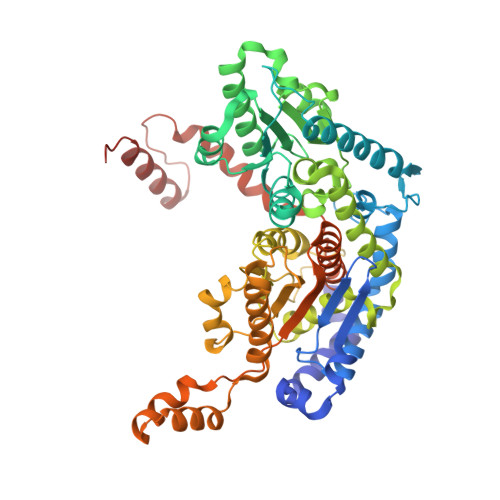The crystal structure of mouse phosphoglucose isomerase at 1.6A resolution and its complex with glucose 6-phosphate reveals the catalytic mechanism of sugar ring opening.
Graham Solomons, J.T., Zimmerly, E.M., Burns, S., Krishnamurthy, N., Swan, M.K., Krings, S., Muirhead, H., Chirgwin, J., Davies, C.(2004) J Mol Biology 342: 847-860
- PubMed: 15342241
- DOI: https://doi.org/10.1016/j.jmb.2004.07.085
- Primary Citation of Related Structures:
1U0E, 1U0F, 1U0G - PubMed Abstract:
Phosphoglucose isomerase (PGI) is an enzyme of glycolysis that interconverts glucose 6-phosphate (G6P) and fructose 6-phosphate (F6P) but, outside the cell, is a multifunctional cytokine. High-resolution crystal structures of the enzyme from mouse have been determined in native form and in complex with the inhibitor erythrose 4-phosphate, and with the substrate glucose 6-phosphate. In the substrate-bound structure, the glucose sugar is observed in both straight-chain and ring forms. This structure supports a specific role for Lys518 in enzyme-catalyzed ring opening and we present a "push-pull" mechanism in which His388 breaks the O5-C1 bond by donating a proton to the ring oxygen atom and, simultaneously, Lys518 abstracts a proton from the C1 hydroxyl group. The reverse occurs in ring closure. The transition from ring form to straight-chain substrate is achieved through rotation of the C3-C4 bond, which brings the C1-C2 region into close proximity to Glu357, the base catalyst for the isomerization step. The structure with G6P also explains the specificity of PGI for glucose 6-phosphate over mannose 6-isomerase (M6P). To isomerize M6P to F6P requires a rotation of its C2-C3 bond but in PGI this is sterically blocked by Gln511.
- Department of Biochemistry and Molecular Biology, Medical University of South Carolina, Charleston, SC 29425, USA.
Organizational Affiliation:



















